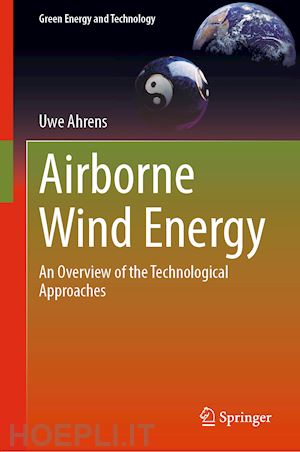

Questo prodotto usufruisce delle SPEDIZIONI GRATIS
selezionando l'opzione Corriere Veloce in fase di ordine.
Pagabile anche con Carta della cultura giovani e del merito, 18App Bonus Cultura e Carta del Docente
This book shows possible solutions to how a profitable energy supply can be implemented with almost no population resistance. Worldwide, more than 80 % of our energy needs are still covered by fossil fuels. Under these circumstances, can climate change still be stopped?
Essential technologies for usage of wind energy with an emphasis on high-altitude wind utilization are presented. Airborne wind energy is one of the most promising technologies to enable a renewable energy turnaround in an economical way. The main problem of conventional renewable energy is the insufficient availability. To ensure a 100 % supply of renewable energy, enormous and very expensive storage capacities would have to be built up.
How we can cover our entire energy needs (electricity, mobility and heat) in the future without fossil fuels, without risking the competitiveness of our economy, is shown in this book.
Foreword.- Introduction.- Historical Outline.- General presentation of wind energy (quality, frequency, energy density, windows of wind, wind directions, weather influences).- Basic differences of the wind utilization concepts.- Classification of conventional wind energy use.- Classification of high-altitude wind energy utilization.- Overview of the players.- Presentation of the technology approaches.- Overview of the investors.- Production potential.- Economic effects.- Ecological effects.- Energy balances.- Material balances.- Evaluation matrix.- Future potential.- List of market participants.- Collection of icons (downloadable).- Overview of abbreviations.- List of sources.
Uwe Ahrens graduated in Aerospace Engineering from Technical University Berlin. In 1989, he founded the medical company aap Implantate AG for which he acted as long-time CEO. Having established a patent basis for a rail-based airborne wind energy conversion technology, he founded NTS Energy Systems in 2007. In 2012, the company successfully demonstrated the core functionality on a linear test section.
Foreword:
Markus Hecht graduated in Mechanical Engineering at RWTH Aachen. After his PhD he worked in the railway industry in Switzerland until he became Professor for Rail vehicles at TU Berlin 1997. Main research topics of his group are energy efficiency and energy recovery.











Il sito utilizza cookie ed altri strumenti di tracciamento che raccolgono informazioni dal dispositivo dell’utente. Oltre ai cookie tecnici ed analitici aggregati, strettamente necessari per il funzionamento di questo sito web, previo consenso dell’utente possono essere installati cookie di profilazione e marketing e cookie dei social media. Cliccando su “Accetto tutti i cookie” saranno attivate tutte le categorie di cookie. Per accettare solo deterninate categorie di cookie, cliccare invece su “Impostazioni cookie”. Chiudendo il banner o continuando a navigare saranno installati solo cookie tecnici. Per maggiori dettagli, consultare la Cookie Policy.